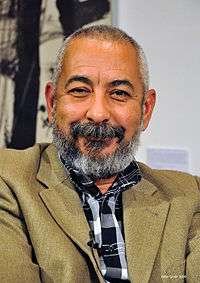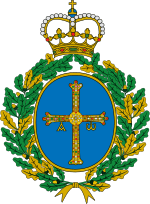Leonardo Padura Fuentes
Leonardo de la Caridad Padura Fuentes (born October 10, 1955) is a Cuban novelist and journalist. As of 2007, he is one of Cuba's best-known writers internationally. In his native Spanish, as well as in English and some other languages, he is often referred to by the shorter form of his name, Leonardo Padura. He has written screenplays, two books of short stories, and a series of detective novels translated into 10 languages. In 2012, Padura was awarded the National Prize for Literature, Cuba's national literary award and the most important award of its kind. In 2015, he was awarded the Premio Principe de Asturias de las Letras of Spain, one of the most important literary prizes in the Spanish-speaking world and usually considered as the Iberoamerican Nobel Prize.[1]
Leonardo Padura Fuentes | |
|---|---|
 Leonardo Padura Fuentes | |
| Born | October 10th, 1955 Cuba, Havana |
| Occupation | Novelist, journalist |
| Language | Spanish |
| Nationality | Cuban, Spanish |
| Genre | Crime fiction, journalism |
| Notable works | Fiebre de caballos, Adiós, Hemingway, El hombre que amaba a los perros |
Life and career
Padura, who was born in Havana, took a degree in Latin American literature at the University of Havana. In 1980 he first came to prominence as an investigative journalist in a literary magazine called Caimán Barbudo, a well-established publication that is still published today. He became known as an essayist and a writer of screenplays and in particular, detective novels.
He wrote his first short novel between 1983 and 1984. Titled Fiebre de caballos (Horse Fever), it was basically a love story. During the next six years, he continued to work as a journalist, reporting on a wide range of cultural and historical topics. However, around this time he began to write his first novel featuring police officer Mario Conde. While he was writing it, Padura realised how fundamental his years as a journalist were to his development as a writer. Firstly it gave him a whole new experience of the country, and secondly, it changed his style with respect to his first book.
In 2013, France named him a Chevalier of the Ordre des Arts et des Lettres.[2]
Padura still lives and writes in his native city of Havana.[3]
"In one of his essays entitled 'I would like to be Paul Auster,' Padura complains that he would love not to be constantly asked about politics in his country and why he continues living there. But this is very much his niche: he is widely seen as the best writer in Cuba, a country whose best writers were all formed before Castro rule. He offers us an off-the-beaten-path visit of a relatively closed society, a prose that is free of propaganda (though not liberated from surveillance). By occupying a small but significant critical space in Cuba, Padura becomes more interesting for Cuba observers and more intriguing for students of cultural and literary trends in the island."[4]
Mario Conde books
Padura is best known in the English-speaking world for his quartet of detective novels featuring lieutenant Mario Conde. Collectively titled Las cuatro estaciones (The four seasons), they are sometimes called The Havana Quartet in their English translations. Conde is a cop who would rather be a writer, and admits to feelings of "solidarity with writers, crazy people, and drunkards". These books are set respectively in winter, spring, summer and autumn (Vientos de cuaresma literally means "Lenten Winds" and Paisaje de otoño, "Autumn landscape"):
- Pasado perfecto (1991, translated as Havana Blue, 2007)
- Vientos de cuaresma (1994, translated as Havana Gold, 2008)
- Máscaras (1997, translated as Havana Red, 2005)
- Paisaje de otoño (1998, translated as Havana Black, 2006)
The four books were adapted as four Spanish language television films, which have been released in a group with English subtitles as the Netflix mini-series Four Seasons in Havana.[5] They star Cuban actor Jorge Perugorría and were produced by Tornasol Film.
An English-language remake named Havana Quartet was considered by Starz, with Antonio Banderas tagged to act as Conde,[6][7] but it did not proceed beyond the development stage.[8] BBC Radio broadcast dramatizations of the four stories in 2014.
Paisaje de otoño won the 1998 Premio Hammett of the Asociación Internacional de Escritores Policiacos (International Association of Crime Writers). This prize should not be confused with the similarly named Hammett Prize given by the North American branch of the organization, which is restricted to United States and Canadian authors.
Padura has published two subsequent books featuring Conde, the novella Adiós Hemingway (Padura’s first book to be translated into English, in 2005), and a recent novel La neblina del ayer (The Fog of Yesterday, published in English as Havana Fever).[9] The Havana-Cultura website comments on the similarities and differences between Padura and Hemingway, and how they might explain Padura's decision to feature the expatriate American in Adiós Hemingway.
Other works
Padura's historical novel El hombre que amaba a los perros (The Man Who Loved Dogs) deals with the murder of Leon Trotsky and the man who assassinated him, Ramon Mercader. At almost 600 pages, it is his most accomplished work and the result of more than five years of meticulous historical research. The novel, published in September 2009, attracted a lot of publicity mainly because of its political theme. The novel centres "on Stalin’s murderous obsession with Leon Trotsky, an intellectual architect of the Russian Revolution and the founder of the Red Army", and considers "how revolutionary utopias devolve into totalitarian dystopias."[10]
Padura's books are also available in French (including all the books featuring Conde), Italian, Portuguese, German, Greek, and Danish.
Bibliography
Books
- Padura, Leonardo (1988). Fiebre de caballos. Havana: Editorial Letras Cubana.
- Pasado perfecto, 1991 ("Havana Blue", 2007).
- Vientos de cuaresma, 1994 ("Havana Gold", 2008).
- Máscaras, 1997 ("Havana Red", 2005).
- Paisaje de otoño, 1998 ("Havana Black", 2006).
- La novela de mi vida, 2002.
- Adiós Hemingway, 2005.
- La neblina del ayer, 2005 ("Havana Fever", 2009).
- El hombre que amaba a los perros, 2009 (The Man Who Loved Dogs, 2014).
- La cola de la serpiente, 2011.
- Herejes, 2013 ("Heretics", 2017).
- La transparencia del tiempo, 2018.
Critical studies and reviews of Padura's work
- Anderson, Jon Lee (October 21, 2013). "Private eyes : a crime novelist navigates Cuba's shifting reality". Letter from Havana. The New Yorker. 89 (33): 60–71.
"How to Write from Mantilla, or the Small Heresies of Leonardo Padura," chapter 5 in Yvon Grenier, Culture and the Cuban State, Participation, Recognition, and Dissonance under Communism (Lexington Books, 2017).
References
- Staff writer (December 19, 2012). "Cuba's National Literature Prize Awarded to Leonardo Padura". Havana Times. Retrieved December 20, 2012.
- "Leonardo PADURA, Officier des Arts et des Lettres". French Embassy in Cuba (in French). Retrieved 21 January 2013.
- "Leonardo Padura - Planeta de Libros". PlanetadeLibros. Retrieved 18 January 2019.
- Yvon Grenier, Culture and the Cuban State, chapter 5 "How To Write From Mantilla, Or The Small Heresies Of Leonardo Padura" (Lexington Books, 2017)
- Miller, Peter (24 July 2017). "July 26 Cuba program features Brookline's Lee Schlenker". Brookline TAB. Retrieved 13 February 2018.
- Andreeva, Nellie (31 July 2015). "Antonio Banderas To Star In 'Havana Quartet' Drama Series In Works At Starz".
- Andreeva, Nellie (9 January 2016). "Starz's Chris Albrecht On 'The Chair', 'Making A Murderer', 'American Gods', Diversity & Filming In Cuba – TCA".
- Andreeva, Nellie (13 September 2017). "Starz Greenlights Drama Series 'Vida' In Push To Attract Latino Viewers". Deadline.com. Retrieved 3 January 2018.
- Khaneka, Pushpinder (29 August 2017). "The best books on Cuba: start your reading here". The Guardian. Retrieved 19 February 2018.
- Bardach, Amy Louise (13 April 2014). "Cuba's Preeminent Writer Takes Some New Chances". Los Angeles Review of Books.
Further reading
- Uxo, Carlos, ed. (2006). The Detective Fiction of Leonardo Padura Fuentes. Manchester: Manchester Metropolitan University Press. ISBN 1-870355-11-3. Articles in English and Spanish.
- Wilkinson, Stephen (2006). Detective Fiction in Cuban Society and Culture. Oxford & Berne: Peter Lang. ISBN 3-03910-698-8 (US 0-8204-7963-2). This book contains four chapters on Padura and a history of the Cuban detective genre.
- González, Eduardo, (2006). Cuba and the Tempest: Literature and Cinema in the Time of Diaspora. The University of North Carolina Press. ISBN 978-0-8078-3015-4. The long last section of this book is dedicated to Padura's four novels: Las cuatro estaciones, under the title: "1989: The Year that Never Was."
External links

- Leonardo Padura Fuentes on IMDb
- Interview with Padura in Shots ezine
- Interview with Leonardo Padura on Havana-Cultura
- "Perspectivismo y ficción en La novela de mi vida: la historia como versión de sí misma" Artículo de Sonia Behar en Memoria histórica, Género e Interdisciplinariedad: Los Estudios Culturales Hispánicos en el siglo XXI. Eds. Santiago Juan-Navarro y Joan Torres-Pou. Madrid: Biblioteca Nueva, 2007.
- Interview about Cuba and crisis in Ukraine and Venezuela
